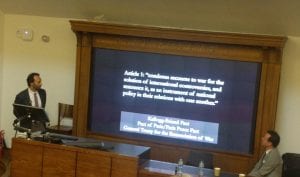International law: Recent and upcoming events and initiatives at UCL Laws
By ucqhiry, on 9 June 2017
This post covers several events and initiatives at UCL Laws concerning international law.
Book launch: ‘Domestic Law in International Investment Arbitration’
On 1 June 2017 UCL Laws and the UCL Workshop Series on Investment Law and Policy (ILAP), in conjunction with Investment Arbitration Reporter held an event for the launch of the book ‘Domestic Law in International Investment Arbitration‘ by Dr Jarrod Hepburn.
Domestic Law in International Investment Arbitration: About the book
Although domestic law plays an important role in investment treaty arbitration, this issue is little discussed or analysed. When should investment treaty tribunals engage with domestic law? How should investment treaty tribunals resolve matters of domestic law? These questions have significant ramifications for both the legitimacy of the investment treaty system and the arbitral mandate of the tribunal members. Drawing on case law, international law principles, and comparative analysis, this book addresses these important issues.
Part I of the book examines three areas of investment law-the ‘fair and equitable treatment’ standard, expropriation, and remedies-in which the role of domestic law has so far been under-appreciated. It argues that tribunals are justified in drawing on domestic law as a relevant factor in their rulings on these three issues. Part II of the book examines how questions of domestic law should be resolved in investment arbitration. It proposes a normative framework for use by tribunals in ascertaining the contents of the domestic law to be applied. It then considers counter-arguments, exemptions, and exceptions to applying this framework, and it evaluates how tribunals have ruled on questions of domestic law to date.

Investment treaty arbitration has endured much criticism in recent times, partly over fears of its encroachment on sovereignty. The book ultimately contends that closer attention by tribunals to one of the principal expressions of a state’s sovereignty-the elaboration of its domestic law-will reduce criticism of the field
Martins Paparinskis (UCL Laws) and Alison Macdonald (Matrix Chambers) served as discussants; the event was chaired by Lauge Poulsen (UCL Political Science).
Current Legal Problems lecture: ‘The Internationalists: How a Radical Plan to Outlaw War Remade the World’
On 8 June 2017, the Current Legal Problems lecture series hosted Professor Scott Shapiro, who presented his book project (co-authored with Professor Oona Hathaway), ‘The Internationalists: How a Radical Plan to Outlaw War Remade the World‘. The event was chaired by Professor George Letsas (UCL Laws).
The Internationalists: How a Radical Plan to Outlaw War Remade the World: About the book
On a hot summer afternoon in 1928, the leaders of the world assembled in Paris to outlaw war. Within the year, the treaty signed that day, known as the Peace Pact, had been ratified by nearly every state in the world. War, for the first time in history, had become illegal the world over. But the promise of that summer day was fleeting. Within a decade of its signing, each state that had gathered in Paris to renounce war was at war. And in the century that followed, the Peace Pact was dismissed as an act of folly and an unmistakable failure. This book argues that that understanding is inaccurate, and that the Peace Pact ushered in a sustained march toward peace that lasts to this day.
The Internationalist s tells the story of the Peace Pact by placing it in the long history of international law from the seventeenth century through the present, tracing this rich history through a fascinating and diverse array of lawyers, politicians and intellectuals—Hugo Grotius, Nishi Amane, Salmon Levinson, James Shotwell, Sumner Welles, Carl Schmitt, Hersch Lauterpacht, and Sayyid Qutb. It tells of a centuries-long struggle of ideas over the role of war in a just world order. It details the brutal world of conflict the Peace Pact helped extinguish, and the subsequent era where tariffs and sanctions take the place of tanks and gunships.
s tells the story of the Peace Pact by placing it in the long history of international law from the seventeenth century through the present, tracing this rich history through a fascinating and diverse array of lawyers, politicians and intellectuals—Hugo Grotius, Nishi Amane, Salmon Levinson, James Shotwell, Sumner Welles, Carl Schmitt, Hersch Lauterpacht, and Sayyid Qutb. It tells of a centuries-long struggle of ideas over the role of war in a just world order. It details the brutal world of conflict the Peace Pact helped extinguish, and the subsequent era where tariffs and sanctions take the place of tanks and gunships.
The Internationalists examines with renewed appreciation an international system that has outlawed wars of aggression and brought unprecedented stability to the world map. Accessible and gripping, this book will change the way we view the history of the twentieth century—and how we must work together to protect the global order the internationalists fought to make possible.
Launch of a new journal: ‘Europe and the World: A Law Review’
On Monday, 19 June 2017, UCL Laws will hold an event to launch a new Journal, ‘Europe and the World – A Law Review’.
Prof. Miguel Poiares Maduro (EUI) will give the keynote speech and Caroline Wilson (Foreign and Commonwealth Office) will chair the event. For more details and registration, see here.
About the journal
Europe and the World – A Law Review aims to contribute to legal scholarship on the place of Europe in the world, with a particular but by no means exclusive focus on the EU’s external relations law.
The Journal serves as a forum where the national, international and EU perspectives meet and engage. The journal is therefore irreverent of traditional distinctions between EU, international, and national law. While primarily offering legal doctrinal and theoretical analyses, the journal also publishes multi-disciplinary work and political science and international relations contributions with an external perspective on the law of EU’s external relations.
The Journal includes 4 articles and 1 editorial:
- ‘Making Transnational Markets: The institutional politics behind the TTIP’, Marija Bartl.
- ‘The EU and International Dispute Settlement’, Allan Rosas.
- ‘Of Presidents, High Representatives and European Commissioners: The external representation of the European Union seven years after Lisbon’, Frank Hoffmeister.
- ‘(Not) Losing Out from Brexit’, Annette Schrauwen.
- Editorial
 Close
Close




